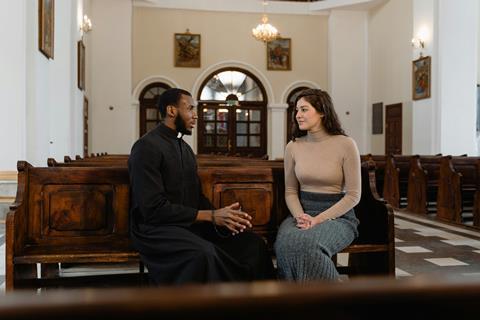Premier Christianity uses cookies Read our cookie policy.
By 2025-11-19T16:17:00+00:00
After witnessing abuse scandals up close and personal, Rev Jamie Sewell knows that accountability isn’t an optional extra for Christian leaders. It’s vital for the health of the whole Church 
Source: Pexels/Mart Production
Weeks after being ordained, I’d just moved into my parish in White City and decided to don my dog collar. I wasn’t sure how I would be received, but I began by knocking on doors, simply introducing myself to parishioners.
To my surprise and encouragement, the collar opened doors, literally. Nervous community members would hear an unfamiliar male voice at the door, and hesitantly open the door just enough to peep through the gap. The moment they saw the collar, the door would swing wide open. There was a level of trust offered to me — an unfamiliar, tattooed, white man with a skinhead, that I might not have otherwise received.
And then, walking home one afternoon, still encouraged from a string of positive conversations and prayerful encounters, I was approached by someone else. I thought this was going to be the cherry on top. He made a beeline for me and asked: “Excuse me, are you a vicar?”
“Yes,” I replied, expecting another opening for pastoral support. Instead, he said: “Great. Could you tell me why all vicars are paedophiles?”
It stopped me in my tracks. In that moment, I realised that for many, my collar represents help, hope, and pastoral care. But for others, the very same symbol represents wretched abuse.
As much as I’ve been blessed with inspirational leaders throughout my life, I’ve also witnessed abuse. One of my favourite teachers at my Catholic school, a respected Eucharistic minister and community leader, was also our scout leader. I admired him until, at the age of ten, I learned he had been arrested and imprisoned for paedophilia. Not too many years later, a local vicar, who presented as cool and relevant, was found guilty of similar abuses of power. Over the years I have seen church after church rocked by the failings of trusted leaders.
This is where I want to begin: not with theory but with lived memory, and the recognition that leadership, whether in church or politics, carries both opportunity and danger.
In my late teens I became fascinated with the New Testament church, especially the model in Acts 2. The church met in the temple courts and in homes, they ate together, shared the apostles’ teaching, sold their possessions, and lived in community. It was a reality I hungered for. How could we do church the way they did in the New Testament?
Living in Rugby, I wasn’t far from Northampton, the birthplace of the Jesus Army. The movement was founded by Noel Stanton in 1969, inspired by radical discipleship and community living. Growing up, I had known children who grew up in Jesus Army community houses.
They would arrive at school in minibuses with “Jesus Army” graffitied on the side. On some level we thought it looked kind of cool, but mostly it struck us as odd and peculiar.
By my late teens I wanted to explore it for myself. From what I could see the Jesus Army had taken Acts 2 as literally as possible. I visited one of their community houses and was given a tour. I was inspired: here was a community that seemed serious about faith, serious about living sacrificially. But I couldn’t escape a sense of concern in my gut.
Leaders who fall often share one trait: they became untouchable, surrounded only by admirers, unwilling to be challenged.
I didn’t witness abuse, but I did notice how vulnerable people were made. Members gave up their possessions and didn’t seem to have the option of taking them back. Rules were rigid. Questioning appeared unwelcome. Thankfully, I listened to my gut and walked away. Since then, survivors’ testimonies and investigations have revealed the darker truth: abuses of power, finances, and appalling instances of sexual assault and rape.
What began as a movement of radical faith and community ended up wounding countless lives. Adults gave up everything, even raising their children in Jesus Army communities. Now, a whole generation of those children are trying to reintegrate into a world they didn’t fully grow up in, whilst trying to unpack trauma they received at the hands of a community they loved.
So I find myself asking: did these leaders begin with bad intentions, predators from the start? Perhaps some did. But perhaps others began sincerely, only for authority and power to expose hidden cracks. With power comes opportunity, and where opportunity abounds, any chink in the armor, any weakness, frailty, or perversion, can be magnified.
Scripture is honest about this reality. “Each person is tempted when they are dragged away by their own evil desire and enticed. Then, after desire has conceived, it gives birth to sin; and sin, when it is full‑grown, gives birth to death.” (James 1:14–15). Seeds of sin grow quickly into oaks; we need to uproot them while they are seedlings.
“Your enemy the devil prowls around like a roaring lion looking for someone to devour” (1 Peter 5:8). And as Jesus said, “The thief comes only to steal and kill and destroy” (John 10:10). Power doesn’t create sin in us, but it does create new opportunities for the sin already there to come to the surface.
And that’s not just true for kings or celebrities. It’s true in everyday life. When you’re a caretaker with the keys to the store cupboard, do you pocket what isn’t yours? When you’re leading a crèche and a child is difficult, do you respond with patience or with cruelty when no one is watching? And I guess for each of us, whatever the circumstances, as our influence grows, so does our capacity for failure. We would be foolish to believe that we are not capable of great sin. We are not above abuse, pride, or compromise.
As I move from curacy towards becoming priest-in-charge, I feel that reality more sharply than ever. Accountability is not optional. When I mistreat a colleague, I must apologise quickly. When I watch something that corrodes my soul, I must confess it.
And ironically, the very thing that creates opportunity for abuse, Christian community, is also the very thing that saves us. Leaders who fall often share one trait: they became untouchable, surrounded only by admirers, unwilling to be challenged.
In contrast, the structures of the Church of England, frustrating as they can be, have been a gift. My PCC has pushed back on ideas I’m eager to run with, or challenge times I might be snappy in meetings. At times it feels like an obstacle, but in reality, it is a safeguard. The checks and balances keep me honest.
In my personal life, it means keeping short accounts with my wife, talking openly with friends, and refusing to present myself as a flawless leader. I am not. I wrestle with lust, greed, and the pull of power. Confession is essential, not just to one another, but at the foot of the cross, where we acknowledge that only Christ is without fault.
Even in parish life, I feel the subtle temptations. Parishioners, in their kindness, will sometimes stop me from sweeping or carrying chairs out of honour for my role. I know it comes from love, but I also know the danger. Jesus modelled servant leadership: “the last will be first.” If I stop picking up a broom, I hope friends will be quick to hand me the mop. The danger in all walks of life is that we surround ourselves with people who say what we want to hear and avoid loving challenge. That is the path to pride, and pride is always the beginning of the fall.
Leadership will always carry risk. The challenge for the church, for politics, for every sphere of life, is not to pretend that leaders are above sin but to create cultures where accountability, confession, and servant leadership are normal.
Only then can we protect the vulnerable, resist corruption, and reflect the one who came not to be served, but to serve.


Grab this Deal!
We’re celebrating a remarkable journey from our humble beginnings as Buzz in the 1960s to the vibrant, multi-platform publication we are today. One thing has remained constant: our commitment to connecting faith with the world around us. To celebrate our birthday, we are offering you a Print and Digital subscription for just £24 your first 12 months!
Subscribe Today
*Offer applies in UK only, but check here for our overseas offers
2025-11-18T14:01:00Z
Bible Society researcher Dr Rob Barward-Symmons hits back at claims made by Tim Wyatt that new Church of England attendance figures discredit the much talked about Quiet Revival report
2025-11-12T09:24:00Z
The new CofE attendance figures prove that the claims made by Bible Society’s Quiet Revival report just don’t hold up, says Tim Wyatt
2025-11-11T09:31:00Z
Dr Selina Stone’s latest book tackles the uncomfortable connection between theological beliefs and abuse within evangelical Christianity, examining high-profile scandals and challenging commonly-held doctrines
2025-11-14T16:26:00Z
As Gaza’s fragile ceasefire hangs by a thread, the territory’s 1,000 Christians – many of whom have spent two years sheltering in bombed churches – must decide whether to flee to safety or stay in the land where Christianity was born
2025-11-13T12:03:00Z
Christian meditation is nothing to be afraid of. In fact contemplative and silent prayer is the most consistently emphasised aspect of Jesus’ own prayer life, argues Chris Whittington. The future of Christianity will not be louder, but quieter and deeper
2025-11-12T15:29:00Z
The departure of the BBC’s director general and news CEO raise questions about the difference between political gesture and making amends, says George Pitcher. The Christian concept of penance has much to offer
Site powered by Webvision Cloud

